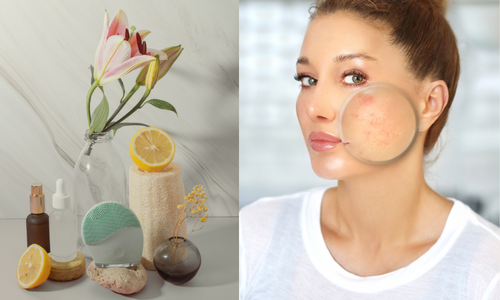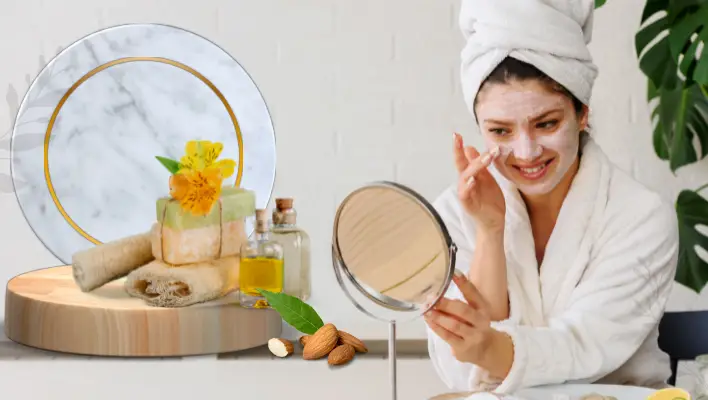There is no one-size-fits-all answer to the question of what the best natural skin care routine for acne is, as everyone’s skin is unique. However, there are some general tips that can help to clear up acne and keep skin looking and feeling healthy.

What are the types of acne?
Acne is a common skin condition that affects people of all ages. Some are mild and can be treated with over-the-counter treatments, while others may require the help of a doctor. There are four types of acne: blackheads, whiteheads, papules, and pustules. Blackheads and whiteheads are the two most common types of acne. Papules and pustules are less common, but can be more severe.
Here is a description of each one, along with its symptoms:
Blackheads
They’re a type of acne, and they’re most commonly found on the face, nose, and chin. Blackheads are caused by a buildup of oil and dead skin cells. When these substances mix, they clog your pores and turn black.
Whiteheads
Whiteheads are a type of acne that can be frustrating to deal with. They are small, hard bumps that often appear on the face, back, and chest. Whiteheads are caused by clogged pores and excess oil production.
Papules
Papules are small, raised bumps on the skin that are usually red or pink. They can be itchy or painful, and they may occur in clusters. Papules are a common symptom of many skin conditions, such as acne, eczema, and psoriasis.
Pustules
Pustules are small, raised bumps on the skin that are filled with pus. They can be found on any part of the body, but are most commonly seen on the face, chest, back, and arms. Pustules are often red and inflamed, and can be painful to the touch. If the pustule is popped, the pus inside can spread the infection to other parts of the body. It is characterized by red and pink spots. It is more severe than non-inflammatory acne and causes more damage to the skin.
How to build an effective natural skincare routine for acne prone skin?
A proper skincare routine addresses internal factors that contribute to chronic inflammation and can help establish a balance in the sensitive microbiome of the skin. Acne is a common skin condition that can be both frustrating as well as embarrassing. If you suffer from acne, you may be looking for ways to improve your skin. A natural skincare routine can be an effective way to clear your skin and prevent future breakouts.
Things to keep in mind when creating a natural skin care routine for acne
- First, focus on gentle, non-abrasive cleansers. Harsh cleansers can strip your skin of its natural oils, which can actually make acne worse. Instead, look for cleansers with natural ingredients that will clean your skin without drying it out.
- Next, use a light moisturizer to keep your skin hydrated. Just like with cleansers, it’s important to choose a moisturizer that won’t clog your pores or irritate your skin. Again, natural ingredients are always a good choice.
- Finally, don’t forget to exfoliate. Exfoliating helps to remove dead skin cells, which can clog your pores and lead to breakouts. Look for an exfoliator with natural ingredients like sugar or salt.
By following these tips, you can create an effective natural skincare routine that will help to clear your skin and prevent future breakouts.
Best natural acne treatment: Natural Skin Care Routine For Acne
5 Easy Home Remedies for Acne
Grape Cleanser
Grapes have natural cleansing properties that can help to unclog pores and get rid of excess oil. Simply mash up a few grapes and apply them to your face. Leave on for 10-15 minutes and then rinse off with warm water.
Cucumber Face Mask
Try a cucumber face mask which are full of vitamins and minerals that can help to soothe and heal the skin. Plus, they have anti-inflammatory properties that can help to reduce redness and swelling.
Simple Honey Mask
Honey is a natural humectant that helps retain moisture in the skin. It is also antibacterial and anti-inflammatory, making it ideal for acne-prone skin. Lemon is rich in vitamin C, an antioxidant that brightens the skin and helps to reduce dark spots. To make the mask, simply mix equal parts honey and lemon juice. Apply it to clean, dry skin and leave it on for 15-20 minutes. Rinse with warm water and pat dry. Use this mask once or twice a week for best results.
Oatmeal Facial
Oatmeal is a gentle, natural cleanser and exfoliator that can be used on all skin types, including sensitive skin.
To make an oatmeal facial mask, simply combine 1/2 cup of oatmeal with 1 cup of boiling water. Let the mixture cool for a few minutes, then apply it to your face and neck. Leave the mask on for 10-15 minutes, then rinse it off with cool water.
For an extra boost of hydration, add a few drops of olive oil or honey to the oatmeal before applying it to your skin.
Turmeric Facial Mask
Turmeric has long been used as a natural remedy for acne. It is thought to help reduce inflammation and swelling. You can make a simple mask with turmeric & other ingredients that may help to clear your skin.
Therefore, to make a turmeric mask, mix one teaspoon of turmeric powder with two tablespoons of plain yogurt. So, you can also add a pinch of black pepper to this mixture. At last, apply the mask to your face and let it sit for 20 minutes. Rinse it off with warm water.
Frequently asked questions
Q. What is the best natural skin care routine for acne?
A. The best natural skin care routine for acne involves cleansing the skin with a gentle, non-drying cleanser, using a light moisturizer, and exfoliating the skin regularly.
Q. What ingredients should I look for in natural acne skin care products?
A. Look for natural acne skin care products that contain ingredients like tea tree oil, aloe vera, and green tea extract.
Q. What are some tips for preventing acne flare-ups?
A. To prevent acne flare-ups, avoid touching your face with your hands, and keep your hair clean and off your face.
A Final Word to Natural Skin Care For Acne
If you’re still struggling with acne, talk to your doctor or a dermatologist. They can help you find the right treatment plan to clear your skin and keep it healthy.


6 thoughts on “Natural Skin Care Routine For Acne”
Comments are closed.